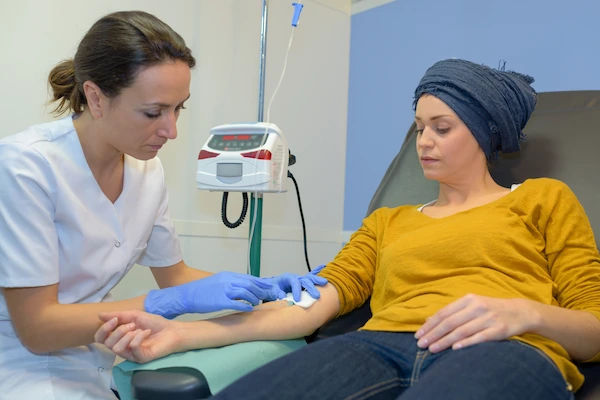Coughing Up Blood? A Complete Guide to Hemoptysis Causes & Treatment
Coughing up blood (hemoptysis) can be alarming. Learn the difference between minor and serious causes, key symptoms, diagnosis methods, and treatment options to protect your health.


Noticing blood when you cough can be a terrifying experience. Your mind might immediately jump to the worst-case scenarios. This symptom, known medically as haemoptysis, can range from a few tiny blood streaks in your phlegm to a more significant event. While it's always a sign that demands medical attention, it doesn't automatically mean something is critically wrong. This guide will walk you through everything you need to know—from common causes and symptoms to diagnosis and treatment. Our goal is to equip you with knowledge, ease your anxiety, and help you understand the crucial next steps to take for your health.
What is Hemoptysis? Understanding the Basics
Hemoptysis is the act of coughing up blood or blood-stained mucus from the lungs or bronchial tubes (the airways that lead to the lungs). It originates from your respiratory tract. It's vital to distinguish this from other sources of bleeding, as the implications are very different.
Hemoptysis vs. Hematemesis: Knowing the Crucial Difference
This is the most important distinction. Hematemesis means vomiting blood from your gastrointestinal (GI) tract, usually the stomach or esophagus.
What Does Blood from the Lungs Look Like?
The blood coughed up in hemoptysis is typically bright red or rust-colored and has a frothy texture because it's mixed with air and mucus from the lungs. You might see:
- Blood-streaked sputum: Small streaks of red or rust-colored blood mixed with your normal phlegm. This is a common presentation of blood in phlegm from conditions like bronchitis.
- Pink, frothy sputum: Often associated with pulmonary edema (fluid in the lungs).
- Mostly blood: Larger volumes of pure blood are less common and indicate a more significant pulmonary hemorrhage.
Common Causes of Coughing Up Blood
Many conditions can lead to irritation or damage in the airways, causing them to bleed. Most cases are not life-threatening.
Respiratory Infections (Bronchitis, Pneumonia, Tuberculosis)
Infections are the leading cause of minor hemoptysis. Severe, prolonged coughing can break small blood vessels in the airways.
- Acute Bronchitis: A common cause of coughing up blood with mucus. The inflammation from the infection makes the bronchial tubes fragile.
- Pneumonia: Lung infections can cause inflammation and damage to lung tissue, leading to bloody or "rusty" sputum.
- Tuberculosis (TB): This serious bacterial infection can cause significant lung damage and is a major cause of hemoptysis worldwide.
Chronic Lung Conditions (COPD, Bronchiectasis, Cystic Fibrosis)
Long-term lung diseases cause persistent inflammation and structural damage.
- Chronic Obstructive Pulmonary Disease (COPD): Including chronic bronchitis and emphysema, COPD often involves a chronic cough with sputum that can become blood-tinged during flare-ups.
- Bronchiectasis: This condition involves permanently widened and scarred airways, which are prone to infection and difficult to clear, making bloody sputum a frequent symptom.
- Cystic Fibrosis: A genetic disorder that leads to thick mucus buildup in the lungs, resulting in recurrent infections and hemoptysis.
Serious Causes of Hemoptysis You Shouldn't Ignore
While many causes are manageable, hemoptysis can be a warning sign of a severe underlying condition.
Lung Cancer and Other Cancers
This is the fear many people have. A tumor in the lung or airway can erode into blood vessels and cause bleeding. Coughing up blood is a key early sign of lung cancer, especially in current or former smokers. Cancers from other parts of the body that spread to the lungs (metastases) can also cause this symptom.
Pulmonary Embolism (Blood Clot in the Lung)
A pulmonary embolism (PE) is a sudden blockage in an artery in the lungs, usually by a blood clot that traveled from the legs. This is a life-threatening emergency. Symptoms of a pulmonary embolism often include sudden shortness of breath, sharp chest pain, and coughing up blood or bloody mucus.
Autoimmune and Inflammatory Conditions
Conditions like lupus, granulomatosis with polyangiitis, and Goodpasture syndrome can cause the immune system to attack the blood vessels in the lungs, leading to inflammation and bleeding.
Consult a Specialist for Personalised Advice
When is Coughing Up Blood a Medical Emergency?
Any instance of coughing up blood warrants a call to your doctor. However, certain signs indicate you need immediate emergency care.
Red Flag Symptoms: When to Go to the ER Immediately
Seek emergency medical attention if you experience:
- Coughing up more than a few teaspoons of blood.
- Blood is dark or contains food particles (suggesting hematemesis).
- Chest pain, dizziness, lightheadedness, or severe shortness of breath.
- Rapid or irregular heartbeat.
- Fever higher than 101°F (38.3°C).
- The bleeding does not stop or is getting worse.
Do not drive yourself to the hospital. Call for an ambulance.
How is Hemoptysis Diagnosed? The Doctor's Process
Finding the cause is essential. A doctor will start with a detailed history and physical exam, asking about the amount of blood, duration, smoking history, and other symptoms.
Imaging Tests: Chest X-rays and CT Scans
- Chest X-ray: This is often the first test to look for masses, infections, or fluid in the lungs.
- CT Scan (Computed Tomography): A CT scan provides a much more detailed, 3D image of the chest and is excellent for identifying small tumors, blood clots, or other abnormalities that an X-ray might miss. It's a cornerstone of the diagnosis for coughing blood.
Advanced Procedures: Bronchoscopy and Biopsy
Bronchoscopy: This is a key procedure. A doctor inserts a thin, flexible tube with a camera (bronchoscope) through your nose or mouth into your airways. This allows them to directly visualize the source of the bleeding and, if needed, take a small tissue sample (biopsy) for analysis. Apollo24|7 offers seamless coordination for diagnostic procedures like bronchoscopy at our partner hospitals, ensuring you get a swift and accurate diagnosis.
Treatment Options for Hemoptysis
Treatment is entirely dependent on the underlying cause. Stopping the bleeding is the immediate goal, but addressing the root problem is essential for long-term health.
Treating the Underlying Cause
Antibiotics for bacterial infections like pneumonia or bronchitis.
- Steroids for inflammatory conditions.
- Chemotherapy, Radiation, or Surgery for lung cancer.
- Blood Thinners for a pulmonary embolism.
- Specialized therapies for autoimmune diseases.
Managing Minor Bleeding
For minor bleeding caused by a simple infection, rest, cough suppressants, and hydration may be all that's needed while the infection clears.
Emergency Interventions for Massive Hemoptysis
In life-threatening situations, procedures to control bleeding are critical. These can include:
Embolization: A radiologist threads a catheter into the bleeding vessel and injects material to block it.
- Laser Therapy or electrocautery during a bronchoscopy to seal a bleeding vessel.
- Surgery: To remove a diseased portion of the lung in severe cases.
Consult a Specialist for Personalised Advice
Consult a Specialist for Personalised Advice

Dr. Mainak Baksi
General Practitioner
13 Years • MBBS , MD (MPH)
Howrah
Mainak Baksi Clinic, Howrah
(50+ Patients)

Dr. Shaik Abdul Kalam
General Practitioner
3 Years • MD (Physician)
Visakhapatnam
Apollo 24|7 Clinic - Andhra Pradesh, Visakhapatnam
(150+ Patients)

Dr. Pankaj Tripathi
General Practitioner
20 Years • MBBS, MD Pathology
Lucknow
Best Diabetologist Clinic, Lucknow

Dr. K Vijaya Kumar
General Practitioner
5 Years • MBBS
Mottur
PADMAVATHI CLINIC, Mottur

Dr. Manju Shivnani
General Practitioner
31 Years • MBBS
Greater Noida
We care clinic, Greater Noida
Consult a Specialist for Personalised Advice

Dr. Mainak Baksi
General Practitioner
13 Years • MBBS , MD (MPH)
Howrah
Mainak Baksi Clinic, Howrah
(50+ Patients)

Dr. Shaik Abdul Kalam
General Practitioner
3 Years • MD (Physician)
Visakhapatnam
Apollo 24|7 Clinic - Andhra Pradesh, Visakhapatnam
(150+ Patients)

Dr. Pankaj Tripathi
General Practitioner
20 Years • MBBS, MD Pathology
Lucknow
Best Diabetologist Clinic, Lucknow

Dr. K Vijaya Kumar
General Practitioner
5 Years • MBBS
Mottur
PADMAVATHI CLINIC, Mottur

Dr. Manju Shivnani
General Practitioner
31 Years • MBBS
Greater Noida
We care clinic, Greater Noida
More articles from General Medical Consultation
Frequently Asked Questions
Can a throat infection cause me to cough up blood?
While a severe throat infection can cause minor bleeding from inflamed tissues, true hemoptysis comes from deeper in the lungs. If you're coughing up blood, it's important to get a proper evaluation to confirm the source.
I'm a smoker and coughed up a small streak of blood once. Should I be worried?
Yes, you should see a doctor. While it could be from simple irritation, coughing up blood is a potential early sign of lung cancer. It's crucial for smokers to get any respiratory changes checked out promptly.
What does it mean if the blood I cough up is bubbly?
Frothy or bubbly blood is a classic sign of hemoptysis (from the lungs) as opposed to hematemesis (from the gut). The bubbles are caused by air mixing with blood and mucus in the airways.
Can acid reflux (GERD) cause hemoptysis?
GERD typically does not cause true hemoptysis. However, severe, chronic acid reflux can irritate the throat (causing a bloody taste) or even the esophagus, which might be confused with coughing up blood. A doctor can help differentiate.
How do doctors stop severe bleeding from the lungs?
For massive hemoptysis, doctors may use a procedure called bronchial artery embolization, where they block the bleeding vessel, or use special techniques during a bronchoscopy to cauterize (seal) the source of the bleed.


.jpeg)
 Ayurveda Benefits & Uses.webp)
